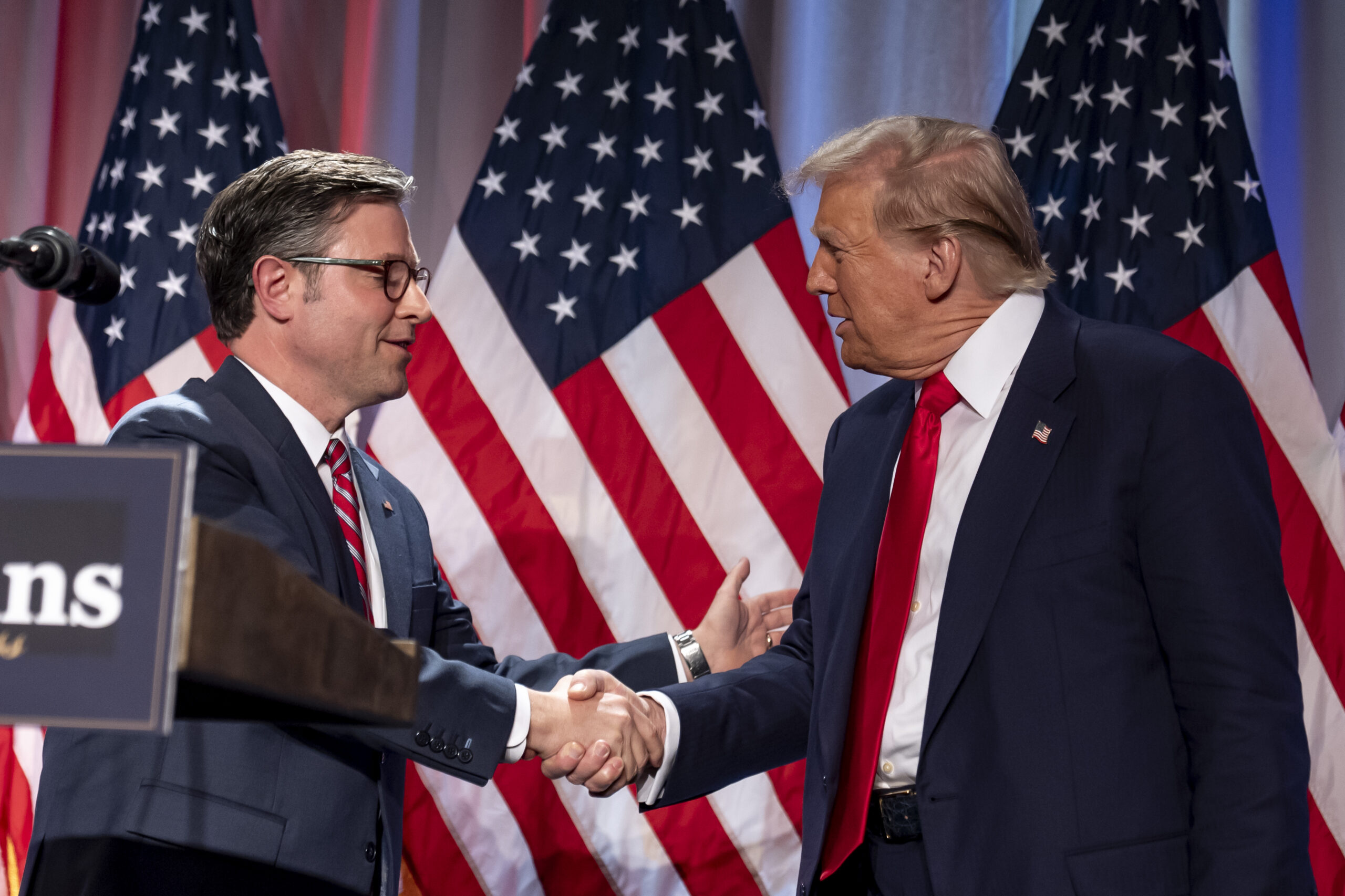
What the Gaetz episode says about Trump’s attempts to control Congress
Donald Trump is making it clear he wants to bend the Republican-led Congress to his will, pushing the limits of what lawmakers will accept on staffing his Cabinet and also on looming questions of federal spending authority.
Round one in that fight — the Matt Gaetz saga — went to Senate Republicans. And it gives early hints of how GOP lawmakers may respond on spending and other controversial nominees.
“The Senate also has a responsibility for advice and consent — and in this particular case, I think there was advice offered, rather than consent,” Sen. Mike Rounds (R-S.D.) said shortly after Gaetz announced he was withdrawing his name from consideration for attorney general.
In that tumultuous episode, GOP senators pushed back privately, not publicly. Many were hesitant to vocally denounce his efforts, knowing the threat of Trump’s wrath and a potential primary challenge constantly shadow them. But they counseled him behind the scenes, hoping he’d acquiesce before they were forced to either bend or defy him outright.
Gaetz won’t be the last example that tests the strategy. Even with the Florida firebrand out, incoming Senate Majority Leader John Thune (R-S.D.) has a slew of problems over Trump’s controversial Cabinet nominees — including sexual assault allegations against Pete Hegseth, who Trump tapped to lead the Department of Defense — as the incoming president leans on Congress to let him circumvent the Senate’s confirmation authority and make recess appointments.
And then there’s spending, arguably Congress’ most important responsibility. Speaker Mike Johnson has kept the House in limbo as he defers to Trump on his preferences for a funding deal, and a shutdown deadline is quickly approaching. Johnson and appropriators have a potentially bigger challenge soon, as the incoming president’s out-of-government allies have made it clear they want to go around Congress’ constitutionally guaranteed power to control federal spending.
“I think we should defend Article One. We’re an equal branch of government. I support probably 80 percent or 90 percent of the policies, but it’s going to be in the Article One vs. Article Two framework,” Rep. Don Bacon (R-Neb.) said about the relationship between Trump and Hill Republicans. Those two articles of the Constitution establish the legislative and executive branch, respectively.
Trump’s anticipated return to Washington is poised to look much different than his arrival in 2017, when he knew little of the ways of Congress and struggled with the persuasive tactics required to push through a legislative agenda. The coming months will lay bare whether his now-numerous Capitol Hill allies will be able to more effectively steer his ambitions — or allow him to steer theirs.
“There will be no daylight between us and President Trump on policy, and moving forward with foreign policy, funding or anything else,” Sen. Markwayne Mullin (R-Okla.), a close Trump ally, told reporters in the Capitol recently.
Trump will likely have his greatest influence in the House, particularly with Johnson leading the chamber. Their fates are closely intertwined, since Johnson will need the president-elect’s support to keep his job in leadership.
And even Republicans who have been fiercely public about reforming the spending process are giving Trump the latitude to decide how to handle the upcoming government funding fight, with the deadline backing up straight into the Christmas holiday.
“You just have a very Trump House, because most people that came in came in with him at the top of the ticket,” said one senior GOP House member, who was granted anonymity to speak candidly.
While lawmakers haven’t explicitly pushed back on efforts to allow the executive branch to make more funding decisions, there are already emerging policy divides between lawmakers and Trump on spending — as well as mass deportations, tariffs and additional aid to Ukraine. Just this week, libertarian-leaning GOP Sen. Rand Paul (R-Ky.) argued that Trump’s plan to use the military to carry out mass deportations of undocumented immigrants would be a “huge mistake.” Several Republicans, including Thune, have raised concerns about tariffs.
But how Republicans handle the various battles will be an early litmus test for how far they are willing to bend to Trump’s effort to control their end of Pennsylvania Avenue. While Johnson has tied himself closely to Trump, Thune has worked to repair their relationship — and recently got social media praise from the president-elect — but will have to try to balance Trump’s demands with what can actually get the votes in the Senate.
“It’s just hard for me to fathom or believe that people have changed so much that they’re willing to give up that responsibility,” Alberto Gonzales, who served as attorney general under George W. Bush, a president also accused of executive overreach, said about the Senate’s confirmation powers.
Asked if there was a lesson for Trump to learn from Gaetz’s withdrawal, incoming Senate Judiciary Chair Chuck Grassley (R-Iowa) said that the only takeaway was that Trump “has the constitutional right to nominate. We have the constitutional responsibility to confirm.
“We each handle our jobs separately,” he said.
Trump-Vance transition spokesperson Karoline Leavitt said in a statement that Trump winning by a “resounding margin” gives him “a mandate to implement the promises he made on the campaign trail. He will deliver.”
During Trump’s first term, he had multiple spending clashes with conservatives on the Hill before many began to align with the iron-fisted president. And the reality that he can make or break someone’s career in politics is now widely recognized, though his attempts are not always successful.
One House Republican, granted anonymity to speak frankly, recounted how several members have survived primaries after facing attacks from Trump or his allies: “It was just two years ago that Matt Rosendale pushed away the president’s phone call on the House floor. I mean, like, I understand that there’s this optic that we’re gonna all fall in line. I don’t know, do we seem unified?”
But spending deadlines could be where fiscal hawks clash with Trump, despite both calling for reining in government spending. Trump followed other presidents before him in contributing to the national debt, with his administration adding $7 trillion to the total.
Outside of Congress, Trump’s allies are working to grease the way for his agenda to sidestep congressional approval.
Elon Musk and Vivek Ramaswamy, who Trump picked to lead his new so-called Department of Government Efficiency, made the case in a Wall Street Journal op-ed on Wednesday that the Supreme Court could seek to determine whether the 1974 Impoundment Control Act — which restricts the executive branch’s power to alter congressionally appropriated funds — is unconstitutional.
While the discussion, on its own, is a nod to Trump’s pending return to Washington, if the high court sided with them, it would mark a significant shift. And while the idea would likely spark heartburn if enacted, even some Republicans tasked with funding the government aren’t closing the door entirely until they get more information.
“My job is to work with the president, not against the president,” said Appropriations Chair Tom Cole (R-Okla.). “We wouldn’t be in the majority without him, so we’re certainly going to try to work with the president.”
Ursula Perano contributed to this report.

